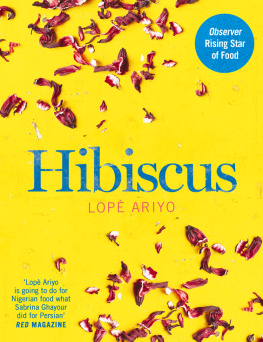With Nigerian recipes, there are many ways toprepare delicious meals. The recipes contained in this book are how I preparethese meals, drinks and snacks.
My knowledge of cooking Nigerian food comes frommany years of preparing these recipes from an early age. So the use of theserecipes, with constant practice, is the combination that will help you masterthese recipes too.
In this book,Ill show you how to prepare traditional Nigerian recipes; no westernizationand no foreign ingredients. I have undiluted Nigerian taste buds therefore Ialways use the traditional ingredients with which we prepare these meals. Wherepossible, I list alternative ingredients you can use in these meals withoutaltering the taste of the meal.
The recipesare so detailed because I want to make it possible for everyone to preparethese meals even with no prior knowledge of Nigerian food.
The recipes may contain ingredients by third partycompanies. It does not mean that I endorse those products. I only mention themfor clarity.
Links to bonus videos are included in the recipes.You will need to be connected to the internet to watch these videos. Keepchecking these videos because I will update them when I find new and improvedways to prepare the recipes.
I sincerely hopeyou will enjoy using this book as much as I enjoyed putting it together.
To get the mostof this book, please read these first: .
If you haveany questions about the recipes in this book, please send me an email to .You can purchase the paperback version of this cookbook on Amazon websites;ISBN 978-8461617548 .
KidsRecipes
The followingtips for babies and toddlers food were given to me by my kids paediatrician.I decided to share this here because one of the challenges I faced when I hadmy first child was what to feed him. I hope new mums will find this helpful.
This advicemay not work for your baby so please consult with your babys paediatricianabout foods that are best for your baby.
General tips for baby food
The best timeto introduce additional food (apart from baby milk and baby cereal) to yourbaby is from 6 months.
New foods should be introduced separately ,leaving at least 7 days to elapse between the introduction of one new food and the next one. This is so that you can easily detect yourbabys intolerances and allergies to certainfoods. If you introduce several new foods at the same time, it will be hard todetect which of the foods is giving your baby allergic reactions if theseoccur. Leaving a considerable amount of time between the introductions of newfoods also gives your baby time to get used to the new tastes.
Once you start giving your baby these new foods, youshould endeavour to give him water frequently.
It is not necessary to add salt or sugar to these foodsbecause fruits and vegetables contain natural salts and sugars that aresufficient for your baby.
It is okay to continue breastfeeding your baby evenwhen he is eating these additional foods.
Do not give your baby cow milk till he is one year old.The only types of milk you should give babies before they are 1 year old arebreast milk and baby milk (baby formula).
You should only give your baby natural foods. Do NOTgive them packaged precooked meals that are sold in supermarkets nor flavouredyoghurts that contain colourants and preservatives.
Food Typesfor Babies: 6 months 12 months
Fruits
Fruits are the first food to introduce to your babyafter cereals. Always mash them before giving them to the baby. They keep thebaby hydrated and they contain carbohydrates,fiber, vitamins and minerals.
It is advisableto start with apple or English pear (not avocado) or banana or orange. These shouldbe fresh, ripe and peeled. The following fruits are knownto cause allergies in babies hence s houldbe avoided at this stage : strawberry,blackberry, raspberry, peach and kiwi. Most fruits are laxatives hence maycause frequent stooling in babies so reduce and increase the quantities ofthese fruits according to your babys needs.
Do not give your baby fruits on an empty stomach. Somake sure you feed your baby (with breast milk, baby formula or cereals) beforegiving him fruits.
Vegetables
It is advisable to introduce vegetables to your babyafter he has become used to eating baby cereals and fruits. Vegetables are asource of hydration, fiber, vitamins and minerals. Potatoes containcarbohydrates.
You can prepare baby vegetable purees withthe following fresh vegetables: potatoes (peeled), tomatoes (peeled),carrots (peeled ) or green beans .For those outside Nigeria, you can also use pumpkin (the flesh), leeks,zucchini or Swiss chard.
You can also add proteins to your babys vegetable purees. Start withchicken breast (without the skin) then later you can introduce beef and othertypes of meat, then fish. Always add a small amount of olive oil to your babysvegetable purees. The vegetable puree should be refrigerated andused within 48 hours.
The following vegetables (some of which are not available in Nigeria) shouldbe avoided till your baby is at least 9 months old:
Flatulent vegetables: cabbage, cauliflower, turnipor swede.
Very aromatic vegetables:garlic, asparagus.
Vegetables rich in nitrates:cabbage, spinach, beet (beetroot), turnip or swede.
Meat
Meats should be given to babies from 6 months. They areproteins that complement the vegetable purees. They contain high valueproteins, minerals (especially iron) and vitamin B complex.
It is advisable to start with chicken breast because itcauses fewer allergies and is easier to mash up. Later you can introduce beef,goat meat and lamb.
Livers and brains do not have any nutritional advantages and it is not advisable to give these to babies because they contain excessive cholesterol. T hey can also contain toxic substances, parasites and sometimes hormones that were fedto the livestock.
Fish
You should start giving fish to your baby from 9 monthsand when you do, it is advisable to start with white fish because they containless fat with less risk of allergies.
Fish contains high value protein, minerals (e.g.phosphorus), iodine, and vitamins. Fish is also rich in Omega 3 fatty acid.Once introduced, fish should be alternated with meat in your babys diet. NEVERgive your baby raw or half-done fish because of the high risk of foodpoisoning.
Eggs
You can start giving your baby very well cooked eggyolks from 10 months. The albumen (egg white) which protects the egg yolk fromdiseases has a high risk of allergies and should only be given to babies fromwhen they are 12 months old.









